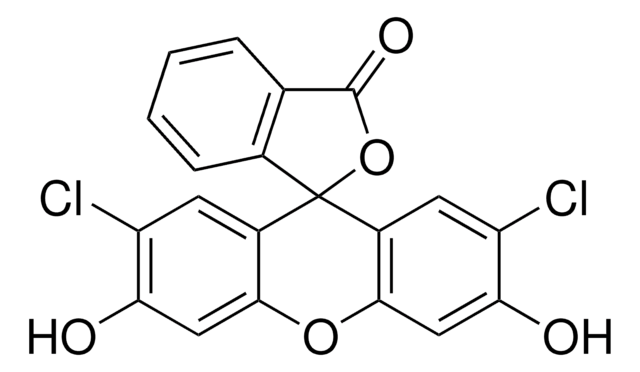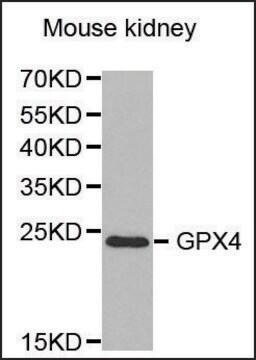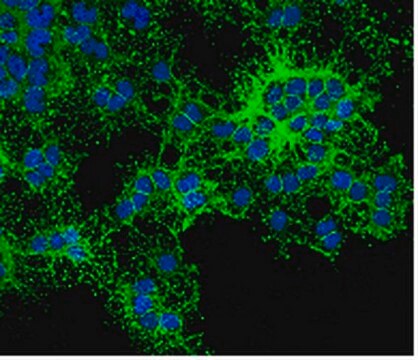MAK143
Fluorometric Intracellular Ros Kit
sufficient for 200 fluorometric tests (green)
Synonym(s):
Fluorometric ROS Detection Kit
Sign Into View Organizational & Contract Pricing
All Photos(2)
About This Item
UNSPSC Code:
12161503
NACRES:
NA.25
Recommended Products
usage
sufficient for 200 fluorometric tests (green)
detection method
fluorometric
relevant disease(s)
cancer; neurological disorders
storage temp.
−20°C
General description
Reactive oxygen species (ROS) are generated as a result of the reduction of oxygen during aerobic respiration and by various enzymatic systems within the cell. At physiological levels, ROS contribute to cell signaling and host defense. Increased ROS generation, above the detoxification capacity of the biological system, results in oxidative stress and cellular damage. The main damage to cells results from the ROS-induced alteration of macromolecules such as polyunsaturated fatty acids in membrane lipids, essential proteins, and DNA. ROS has been implicated in disease states, such as Alzheimer′s disease, Parkinson′s disease, cancer, and aging.
Application
Fluorometric Intracellular Ros Kit has been used in reactive oxygen species (ROS) generation assay.
Suitability
This kit is suitable for the detection of intracellular ROS by fluorescence microplate reader or a fluorescent microscope.
Principle
The Fluorometric Intracellular ROS Assay Kit provides a sensitive, one-step fluorometric assay to detect intracellular ROS (especially superoxide and hydroxyl radicals) in live cells within 1 hour incubation. ROS react with a fluorogenic sensor localized to the cytoplasm, resulting in a fluorometric product (λex = 490/λem = 520 nm) proportional to the amount of ROS present. The assay can be performed in either a 96 or 384 multiwell plate format and read using a fluorescence microscope or a fluorescence microplate reader.
Storage Class Code
10 - Combustible liquids
WGK
WGK 3
Flash Point(F)
Not applicable
Flash Point(C)
Not applicable
Choose from one of the most recent versions:
Already Own This Product?
Find documentation for the products that you have recently purchased in the Document Library.
Customers Also Viewed
Lu Wang et al.
Journal of cellular and molecular medicine, 25(7), 3449-3459 (2021-03-05)
Tumour necrosis factor-α (TNF-α), a crucial cytokine, has various homeostatic and pathogenic bioactivities. The aim of this study was to assess the neuroprotective effect of ketamine against TNF-α-induced motor dysfunction and neuronal necroptosis in male C57BL/6J mice in vivo and HT-22
Multi-functionality redefined with colloidal carotene carbon nanoparticles for synchronized chemical imaging, enriched cellular uptake and therapy.
Misra S K, et al.
Scientific Reports, 6, 29299-29299 (2016)
Hao Chen et al.
Molecular medicine (Cambridge, Mass.), 28(1), 92-92 (2022-08-09)
The forkhead box O3a protein (FoxO3a) has been reported to be involved in the migration and invasion of trophoblast, but its underlying mechanisms unknown. In this study, we aim to explore the transcriptional and metabolic regulations of FoxO3a on the
Jiaqin Hu et al.
Biomedicine & pharmacotherapy = Biomedecine & pharmacotherapie, 120, 109540-109540 (2019-10-23)
To investigate the effect of hydrogen peroxide (H2S) on myocardial clock gene Bmal1 in ischemic cardiomyocytes. Quantitative PCR (qPCR) was used to detect the expression of Bmal1 at the mRNA level in H9C2 rat cardiomyocytes. The protein expressions of Bax
Almira Georgieva et al.
Antioxidants (Basel, Switzerland), 10(10) (2021-10-24)
The wastewater from the distillation of rose oils is discharged directly into the soil because it has a limited potential for future applications. The aim of the present study was to determine in vitro the chromatographic profile, redox-modulating capacity, and
Our team of scientists has experience in all areas of research including Life Science, Material Science, Chemical Synthesis, Chromatography, Analytical and many others.
Contact Technical Service







